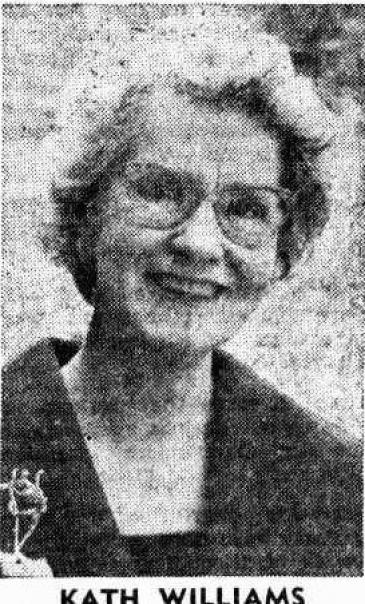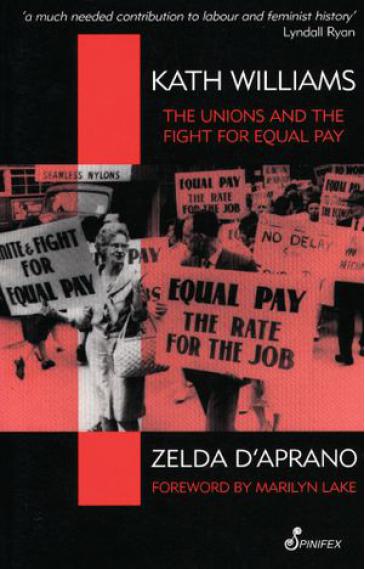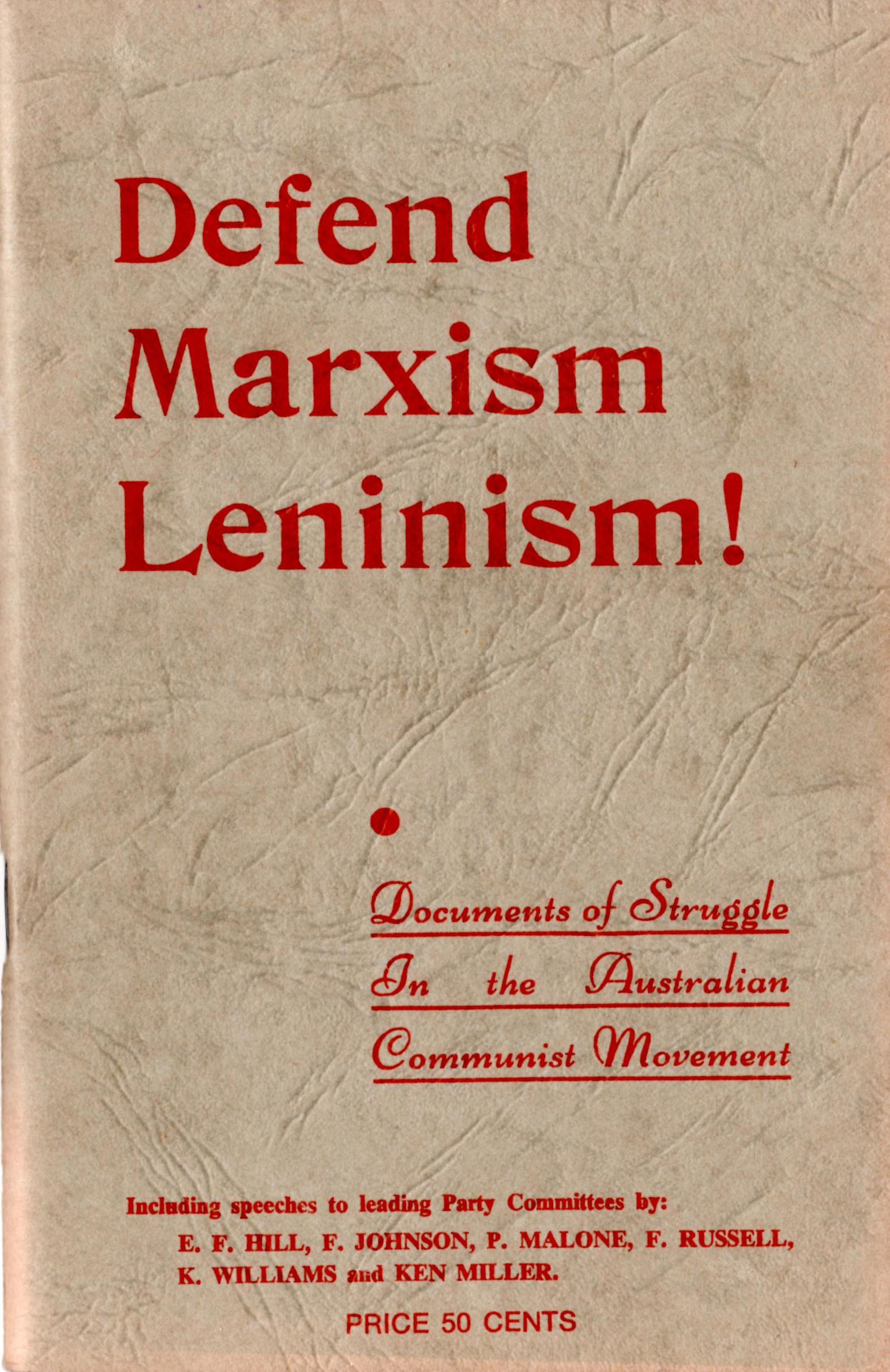Kath Williams (1895-1975)
Written by: Nick G. on 22 May 2021
 One of the outstanding proletarian foundation members of our Party was Comrade Kath Williams.
One of the outstanding proletarian foundation members of our Party was Comrade Kath Williams.
Kath was born on the 23rd April, 1895, in a small town just to the north of Geelong. She graduated as a teacher from the Melbourne College of Domestic Economy in 1915.
On 31 March 1917 she married Percy James Clarey, a young trade union leader.
Kath supported and encouraged his political ambitions within the Labor Party. She became secretary of its Caulfield branch, president of the Women's Organising Committee and a member of the State executive. She stood as Labor candidate for the seat of Caulfield in the Legislative Assembly election of 1935 but withdrew before the poll. In December, with Maurice Blackburn and others, she was excluded from the A.L.P., having spoken at a rally organized by the Victorian Council against War and Fascism; contrary to the party's policy, she advocated that sanctions be imposed against Italy, after its invasion of Abyssinia. She was reinstated the following year.
Her refusal to toe the ALP line aggravated tensions on the domestic front. Her rejection of social democracy led her to join the Communist Party in 1936, and in December of that year she and Percy were divorced.
Kath resumed teaching in 1938, at Portland, and in 1942 transferred to Wonthaggi, where she threw herself into local activities and supported the miners. On 11 August 1945 she married an English-born coalminer, Anthony ('Andy') Williams. He wanted to return to England, and Kath went with him, but the marriage didn’t last. In 1948 she returned alone to Melbourne to work for the Liquor Trades Union. She won a position on the state committee of the Communist Party in the same year, which she used primarily to promote equal pay for women; she also advanced fought for this as union delegate to the Melbourne Trades Hall Council.
She presented the case for equal pay as union delegate to the Melbourne Trades Hall Council and, after the Australian Council of Trade Unions' congress of 1953 agreed to establish equal pay committees in each State, she was elected secretary of the Victorian committee. She also became a delegate to A.C.T.U. conferences. An observer at the first World Conference of Working Women, held in Budapest in 1956, she presented a paper on the campaign in Australia. When she returned, she wrote a booklet about the struggle, Equality Will Be Won (1956).
The Equal Pay Committee set about organising protests, including annual Equal Pay Weeks, petitions and speakers for stop-work meetings.
Industrial militancy and the strength of the union movement proved to be the key factor in winning equal pay. In 1962 a large and important strike for equal pay occurred at the Commonwealth Industrial Gases (CIG) in Preston, Melbourne. The company announced that it wanted to replace up to 30 percent of its existing workforce with women, on the 75 percent female rate. A mass meeting of the CIG workers, mostly from the Amalgamated Engineering Union, decided that they would not oppose women being employed, as long as it was on the full male rate. Negotiations with management broke down and the workers went on strike, joined by the Liquor Trades Union (LTU) canteen workers, who were mostly women. Around 1,000 workers were involved in the strike.
The question of how to respond to the employment of women on lower rates was a genuine concern in the 1960s, as increased mechanisation was used by employers as an excuse to move women into traditionally male dominated industries. The response from the union movement was mixed. The CIG metal unions gave a positive example, but the right-wing Vehicle Builders showed the negative, responding to the threat by attempting to exclude women from the industry. The Equal Pay Committee pointed out that this was a short-sighted approach that was never going to work. Not only were bosses going to continue
to push for women workers while the rate was cheaper but, fundamentally, women had the right and the need to work.
Strikes and other struggles for equal pay continued to consume Kath’s energies throughout the late 60s and early 70s. However, growing revisionism within the Australian communist movement also took up her time. As a leading member of the CPA in Victoria, she sided with Ted Hill and others who could accept neither the changes that Khrushchev was imposing on the international communist movement, nor the undermining of the Australian Party’s revolutionary ideology and politics at the hands of Sharkey, Dixon, Aarons and others.
A fierce ideological struggle occurred at the Victorian State Conference of the CPA in April 1963, and Kath’s powerful speech denouncing the revisionists was included in the seminal booklet Defend Marxism-Leninism published later that year. (We reprint that speech as an appendix to this article).
Resigning from the CPA in the aftermath of its State Conference, Williams worked with Hill and other comrades to establish Vanguard as a voice for genuine Communists. She contributed a number of articles, and although most writers for the paper did not identify themselves, her standing within the peace and women’s movements was such that prominence was given to her as the author of two articles.
In Vanguard Vol 1 no. 9 (March 1964), coinciding with the founding conference of the Communist Party of Australia (Marxist-Leninist), Kath published, under her own name the article “Equal Pay – Basic Wage Rise: The Two Struggles Cannot be Separated”. This condemned a decision by the Trades Hall Council Executive to reject a call to distribute its basic wage leaflet and equal pay leaflets together. The Executive argued that the latter detract from former. Williams attacked this division of the working class. She said a joint leaflet should be issued: “…equal pay is not a question for women, but a class question, affecting the whole class in the struggle for higher living standards.”
In Vanguard Vol 1 no 21 (August 1964), Kath wrote a lengthy report on the 10th World Conference Against A & H Bombs which she was “privileged to attend as a member of the Australian delegation”. She described the conference as a “Glorious Victory for Peace” as it had rejected a ploy by the Soviet revisionists and their supporters to set up an opposition peace conference to water down opposition to imperialism and push a reformist line upon the peace movement. It was a “glorious victory” because the 3000 delegates rejected the splittists and insisted on opposition to imperialism and support for peace, national independence and freedom.
Meanwhile, the Equal Pay Committee was being undermined by the social democratic right-wing Labor leaders of the THC Executive. They were also being undermined by the ACTU because of its refusal to put an equal pay claim before the Commission, and indeed it had ordered its affiliates not to do so.
In 1967 the Labor right split with key left wing unions. It was the left unions that were the strongest advocates for equal pay and most active on the Equal Pay Committee. So, when the split occurred the remaining VTHC turned on Kath Williams and the Committee and dissolved it in late 1968.
Kath was by now in her 70s, and in 1967 she had retired as an organiser for the LTU.
Her active role in the union movement may have ended, but she continued with her mass work until her death on 17 April 1975.
In 2001, fellow equal pay campaigner and member of the CPA, Zelda D’Aprano wrote a biography of Kath titled Kath Williams: the unions and the fight for equal pay. In her introduction to the book, D’Aprano says “Kath Williams made an outstanding contribution to the trade union movement and to the achievement of equal pay.”
She also made an outstanding achievement to the repudiation of modern revisionism, to the defense of Marxism-Leninism and to the growth of the Communist Party of Australia (Marxist-Leninist).
........................................
Kath Williams was one of 11 signatories to the Introduction to Defend Marxism Leninism! It included her speech to the Victorian State Conference of the CPA in April 1963.
We reprint below the text of that speech:
…………
This is the first time I, and some others with differences on the present Party policy, have had the opportunity to state our own position to the membership.
But not all those concerned, for many leading cadres have not been elected to this conference, and others not given the opportunity to speak, as a consequence of the campaign of vilification which has been carried out against us.
We have been accused of disrupting the work of the Party, of damaging unity.
But wat is more disruptive than vilification? This is proved by what has happened in the international Communist movement.
Attacks on fraternal Parties have grown since the first attack at the 22nd Congress of the CPSU - as Comrade Aidit, Chairman of the Indonesian Party, warned they would at the time.
We have heard these attacks from Comrade Sharkey, Jones, Aarons and others. This only serves imperialism and disrupts further the unity of the world Communist movement.
My mass work is in the trade unions, the women’s movement. What have been our guiding principles in this work? In the trade unions we have seen the campaign for equal pay as a class question. We have struggled to bring rank and file women workers into activity for their democratic rights and to unite the whole trade union movement around these demands. And in the process we have helped women to see the source of their double exploitation – to lift their understanding – so that they take the path of struggle against capitalism, and prepare themselves for the task of overthrowing it.
The work in Victoria has been praised by leading comrades in other States for the high degree of activity and unity achieved.
Comrade Betty Oke has outlined the big development of the work in the UAW.
But who has been in the leadership of this organisation?
Comrades Hilda Smith and Meg Arrowsmith have been.
Comrade Meg, who attended the International Conference of Women in Vienna, reported back all over Australia.
She got nothing but praise for the content of her report. Yet at their section conferences, neither of these comrades were re-elected to their section committees nor as delegates to the conferences. Why? Because they have reservations about the policy of the Party.
Comrade Hilda Smith, at her section conference, was accused of dishonesty, because she had not discussed her differences. The section secretary condemned the work of the UAW as narrow, through incorrect leadership.
So what’s going on? Why do we see the great growth in the work – not seen in other States – and yet go after the leaders of this work.
Real Reason For Witch Hunt
It is quite evident that it is not our mass work which is at fault. There is no evidence of our disruption there.
The real reason – not disclosed – is that our removal is necessary to water down further Party policy; to take the revolutionary content out of Marxism-Leninism.
Take a look at the Peace Movement.
Inside Party meetings imperialism is blasted. But outside? At the “women’s march for peace” slogans against bases were not allowed to be named as US bases.
We have not named India as the aggressor against China. What is the inference? That socialism is aggressive! What kind of leadership is this?
Dr. Mannix in his Anzac Day message said: “Our thoughts go to the small band of Australia soldiers in Vietnam, helping the people to defend their freedom against a brutal and often murderous aggressor”.
We know the truth about South Vietnam. If we don’t speak up, how can women – the masses – find the truth? What kind of proletarian internationalism is this?
The ANZ Congress is not the only organisation for peace. In the trade unions we strive to link the struggle for wages with the struggle for peace.
Comrade Malone, in particular, and others, never miss an opportunity to help lift consciousness of the working class on these vital questions.
The working class is the decisive force in the struggle for peace. For this reason we have always held that within the broad peace movement the trade unions must not lose their independent class position while guaranteeing against sectarianism.
But in practice, when we have discussed it in this way, we have been accused of left sectarianism. Does this mean that on the THC, at factory meetings, we will not refer to American imperialism or Australian imperialism, eve though our own national independence is at stake?
We are aware that the working class is made up of many groupings, and the levels of understanding are not the same.
We are not so stupid to go in cold when dealing with imperialism in an abstract way.
Our practice has been to analyse each group, taking them step by step to an even higher level.
Roger Wilson’s statement that our trade union comrades do nothing for peace is one-sided and dishonest. He takes incidental matters to drive home a point.
Our trade union journals over the years have been a mighty weapon in lifting consciousness of the working class.
Lenin, speaking of the trade unions, said: “No politics means bourgeois politics”. This is true f the peace movement, the women’s movement, and the mass movement generally.
Bourgeois ideology is older than that of Marxism-Leninism. We must not underestimate its influence.
We must combat it. Lift the sentiments for peace to an understanding of the cause of war, its class character, distinguish between just and unjust wars.
Turn the anger of the masses against imperialism, not socialism. Deepen understanding. For theory becomes a material force when it grips the masses.
Comrades, left sectarianism is not our problem. The 81 Party Statement names revisionism as the main danger, internationally.
In the objective conditions in our country, this is our main danger, too.
This explains my political position for which I, and others, stand condemned.
For my part I will never be a party to the betrayal of the revolutionary cause of the working class.
Print Version - new window Email article
-----
Go back
Independence from Imperialism
People's Rights & Liberties
Community and Environment
Marxism Today
International
Articles
| Vale Ron Owens |
| VALE Wallace McKitrick: cultural fighter (1950-2025) |
| Farewell Judy Henstock Murupaenga |
| Jack Shapiro: A star shining in our sky |
| Farewell Marie Shapiro, comrade and internationalist |
| Martin O'Malley: Australian Communist Party condolence message |
| Martin O’Malley – Comrade and Friend |
| Vale - Stephen Darley |
| Ernie O’Sullivan |
| Basil Steffanou – A Comrade Who Served the People |
| Harry Danaher – a grand old fighter for socialism |
| Bert Chandler – Lifelong struggle for liberation of the people |
| Kath Williams (1895-1975) |
| More than meets the eye – the CPA(ML) in NSW Part 4 – No surrender |
| More than meets the eye – the CPA(ML) in NSW Part 3 – Whitlam, Uncle Sam and the People |
| More than meets the eye – the CPA(ML) in NSW Part 2: Vietnam, state forces and an east wind |
| More than meets the eye – the CPA(ML) in NSW Part 1 Bert and Syd |
| Betty Little-O’Shea – working class communist |
| Comrade Betty Little/O'Shea: Lifelong Communist |
| Dulcie Steffanou: A communist life devoted to serving working people |
-----


